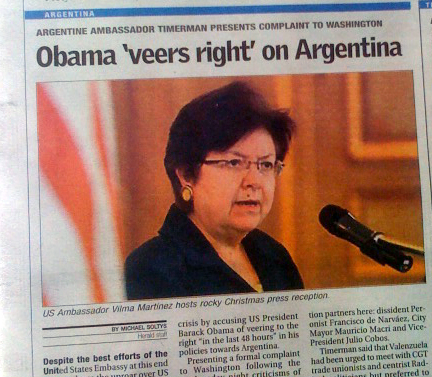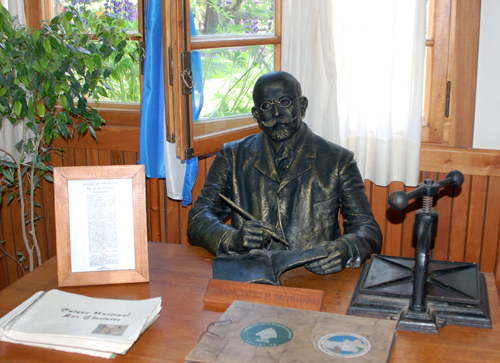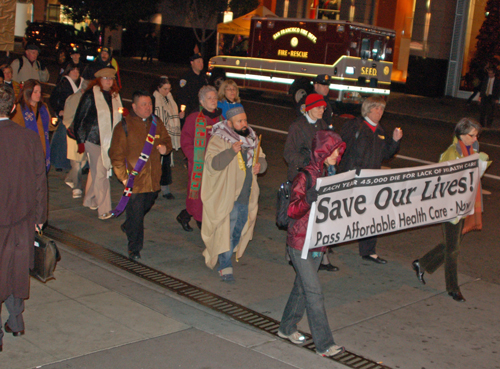 Bruce Chatwin's In Patagonia was the book I should have read before traveling to the hinterland of South America. I didn't, so I'm glad I found the 1977 classic there and consumed it on the way home. If you have any interest in this still-exotic place, I would urge you to do likewise.
Bruce Chatwin's In Patagonia was the book I should have read before traveling to the hinterland of South America. I didn't, so I'm glad I found the 1977 classic there and consumed it on the way home. If you have any interest in this still-exotic place, I would urge you to do likewise.According to the forward by Nicolas Shakespeare, Chatwin was annoyed that his story was marketed as "Travel." I understand that: I'd call this a collection of vignettes that shape a picaresque quest whose truth is more that of marvelous realism than reportage.
If I'd read Chatwin, I'd instantly have been able to place the 10 foot high statue we encountered while walking into Puerto Natales (Chile). It's a kitschy rendering of the town's famous extinct mascot -- the Mylodon, a giant ground sloth -- whose mysterious history shapes Chatwin's wanderings by bus, on horseback and on foot south through the Argentinian back country to the Chilean lands on Straits of Magellan.

Though apparently this Brit's Spanish was rudimentary, the Argentinian frontier in the mid-twentieth century was still so full of odd wanderers, failures, dreamers and exiles from many lands that this was little barrier. He's an economical storyteller, able to convey character with few words. Consider these hotel keepers:
Another encounter in the same tiny town, with a very old, very lonely former cabaret singer:The hotel in Rio Pico was painted a pale turquoise and run by a Jewish family who lacked even the most elementary notions of profit. ...
In the morning, I had a tremendous row about the bill.
"How much was the room?
"Nothing, if you hadn't slept in it, nobody else would."
"How much was dinner?"
"Nothing. How could we know you were coming? We cooked for ourselves." ...
"What can I pay for then? There's only bread and coffee left."
"I can't charge you for bread, but cafe au lait is a gringo drink and I shall make you pay."
Christian missionaries pushed into the area, some of them apparently more interested in anthropological speculation, archeological digs and exploration than spreading the Gospel.At some negative turning point she had married a moon-faced Swede. They joined two failures into one and drifted together to the end of the world. ...The Swede died fifteen years ago and she had never left ...

The Salesian, Father Alberto María D´Agostini (d. 1960), is remembered as a mountain climber in a statue in El Calafate. Chatwin shares an encounter with another Catholic priest out in the boonies:
Frontier life may have precluded a more narrow Christianity."Tell me, brother, which religion are you?"
"Protestant."
"Different road," he sighed. "Same Divinity. Adios, Hermano."
Not all of Chatwin's vignettes from the road are of helpless castaways. There are plenty of dynamic actors, including the famous North American outlaws, Butch Cassidy and the Sundance Kid; European, Chilean and Argentinian scientists, colonizers and swashbucklers -- including Charles Darwin -- whose activities resulted in extermination of the indigenous population; and the prisoners who survived Chile's 1973 military coup, jailed away on remote Dawson Island.

And then there were the "revolutionaries of 1920-1." A leader, Antonio Soto, is memorialized on Calafate's main street. These were laborers, many Chilean, who worked on the great sheep farming estates. When the world wool trade took a dive after the First World War, land owners tried to cut wages; the men had absorbed some socialist and anarchist ideas and they organized. So the land owners called in the Argentinian army who promised freedom to strikers who gave up their weapons and then massacred them. Chatwin quotes a British settler about these events.
Soto survived and escaped to Chile, never again to raise rabble. But other anarchists did kill the Army general who ordered the massacre and tit-for-tat killings went on for some years.I asked Archie Tuffnell about it and he scowled.
"Bad business. Bunch of Bolshie agitators came down and stirred up trouble. That was one thing. Then the Army came down and shot good, honest, reliable men. They even shot my friends. It was a filthy business from start to finish."

It was interesting to see how much public remembrance there still is of these events in the otherwise resolutely commercial, bustling tourist town of El Calafate. I had to wonder whether talk of 1921 was substituting for talk of the much more immediate sufferings of Argentinians under the repressive army regime of the late '70s and early '80s.
If you have the slightest interest in Patagonia, do what I didn't do and read Bruce Chatwin's tale before you go.



































